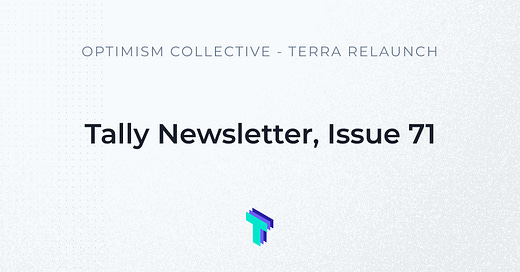Welcome back for issue 71 of the Tally Newsletter, a publication focused on defi and DAO governance. We’ll keep you updated on key proposals, procedural changes, newly launched voting systems, shifting power dynamics, and anything else you need to know to be an informed citizen.
This week we cover:
Terra Reboot’s Inadvertent Impact on Terra Classic Chain
Optimism Kickstarts Governance with Airdrop to Users
Plus quick updates from Tally and the DAO ecosystem.
Terra Launches New Chain without Native Stablecoins
TL;DR: While the launch has generally gone to plan, it has caused significant issues with the old Terra chain.
Following the collapse of the UST stablecoin and original Terra chain (now known as Terra Classic), Do Kwon and other Terra insiders rushed to relaunch a new chain to try to capture some of the community value of Terra based users and developers. With several competing Cosmos ecosystem chains able to host Terra’s users and projects, including Osmosis and Juno which both offer cosmwasm smart contract capabilities, Terra faced a race against time to avoid their community dissipating.
The Terra team were able to quickly organize an airdrop to relaunch LUNA as a standalone smart contract chain without native stablecoins. But in their haste, certain compatibility issues between new Terra (LUNA) and Terra Classic (LUNC) were left unaddressed. Most notably, certain protocols still holding funds on the old Terra chain were exploited due to validators delivering the price for LUNA ($5 or higher) rather than LUNC (less than $0.01) to oracle users.
The Terra team was very keen to maintain the LUNA name for the new chain’s token, but it seems they didn’t fully consider all of the dependencies involved in making a ticker change while the Terra Classic chain remained live and in operation. And with access to the new LUNA tokens partly dependent on conversion of outstanding LUNC and USTC tokens, exploits on the defunct Terra Classic chain still have concrete economic impacts.

Synthetic asset trading platform Mirror Protocol was among the projects most impacted by the oracle issue (along with Anchor protocol), but throughout the process the dev team seems to have been unresponsive, with no communications or remedial action taken since the UST collapse several weeks ago. Additional attention from this issue may have contributed to users uncovering a gaping hole in Mirror’s balance sheet, caused by a $80 million hack that had gone undiscovered for months.


The Mirror exploit likely the longest known time frame between an exploit taking place and being discovered or publicly disclosed, which points to both lack of community engagement and relative niche status of cosmwasm development. It wouldn’t be surprising to find more skeletons in the closet as Terra Classic winds down.
Optimism Launches Initial Token Airdrop
TL;DR: The first round airdrop led to a surge in usage of Optimism’s rollup as well as some controversial governance proposals.
After over a year in operation, Optimism launched their highly anticipated governance token through the first of several planned airdrops. While the launch was largely successful, with the OP token holding above a $5 billion fully diluted valuation, it was not without hiccups.
To kick off launch day, Optimism sent out a cryptic tweet hinting at activity. But they were caught off guard when users discovered that the airdrop contract had been funded with tokens and the required claims proof data was available on Optimism’s site. This allowed some users to begin claiming tokens even before an official announcement that the airdrop was live.
Optimism’s RPC infrastructure quickly buckled under the loan of users rushing to claim, leading the Optimism team to delay launch announcements for several hours while they worked to deploy more resources. But while the claims process was disrupted, Optimism’s rollup itself continued to operate as normal with no interruption in transactions.
Optimism used a claims process similar to Gitcoin or ENS’s previous airdrops to encourage active voter participation from day 1. Users were led through a two step process to claim their tokens and then immediately delegate to ensure their voting power would be active.

While incorporating delegation into the airdrop claims process helps kickstart governance with strong initial participation numbers, it can also lead to unintended consequences. There’s a risk of initial delegation choices being heavily influenced by name recognition rather than capacity to contribute to governance or other objective criteria. And there’s also a risk airdrop recipients will not actively monitor delegate performance, with voting power unlikely to be redelegated after the initial claims process.
While voter and token holder apathy presents one risk to Optimism governance, we’ve also seen an early surge in proposal discussion in the Optimism forum. Most notably, there’s been a proposal to make sellers of the first airdrop ineligible for future OP distributions under the premise that sellers are not contributing to Optimism governance.
Optimism is planning to hold multiple additional airdrop rounds as part of their focus on “retroactive public goods”, so adjusting airdrop criteria based on past experience is firmly within the project’s mandate. But on the other hand, it could be argued that rewarding holders or penalizing sellers is just a less transparent way to implement single sided staking (where users deposit one token to earn more rewards denominated in that token). This was largely the premise of a second, satirical proposal post by Cobie.


Jokes aside, early Optimism governance is likely to face significant controversy in the early stages. In addition to further user airdrops, Optimism governance is also planning to fund a range of liquidity incentives and distributions with partner projects building on Optimism. This should help increase platform utility and adoption, but may also lead to significant selling pressure without any countervailing revenue sources to blunt the dilution. We may see discontent from early airdrop recipients who are upset about the prospect of being dumped on by later users. This dynamic could put significant importance on Optimism’s two body governance structure which includes not only token holders but also a group of appointed “citizens” to help steward the protocol.


Vitalik and others are notable supporters of Optimism’s experiment in non token-based governance, but only time will tell if this structure is properly aligned or devolves into insider politics to protect vested interests at token holders’ expense.
In Brief:
Tally News
Tally engineer Natacha De La Rosa shares how to make any token (funcible or NFT) into a governance token:


Cofounder Dennison breaks down so called “soulbound” non-transferable tokens:


This month’s DAO NYC conference is fast approaching:


Ethereum Ecosystem
PoolTogether Inc launches NFT series to raise funds for legal defense costs:

GFX Labs (governance participant in several projects including Compound and MakerDAO) announces new lending and stablecoin protocol, raising interesting questions about potential conflicts:
Optimism native Velodrome protocol launches decentralized exchange:


Euler Finance lending protocol announces governance launch with Tally and OpenZeppelin governor integrations:

Other Ecosystems
Nansen releases report on triggers for Terra UST collapse:


DAO infrastructure provider Commonwealth raises new funding round:


Waves blockchain proposes plan to bail out USDN stablecoin and Vires lending market:


Thanks for joining us for Tally Newsletter issue 71. Be sure to check out the Tally governance app and join us on Discord for the latest updates!
Anything we missed? New developments or protocols you’d like to see covered? Drop us a line at newsletter@tally.xyz
Best,
Nate, Tally






